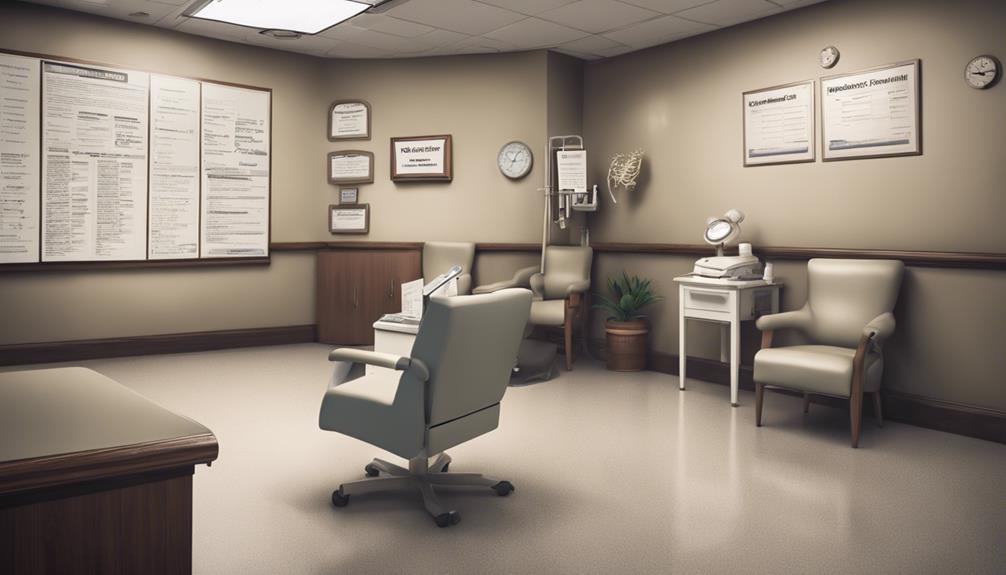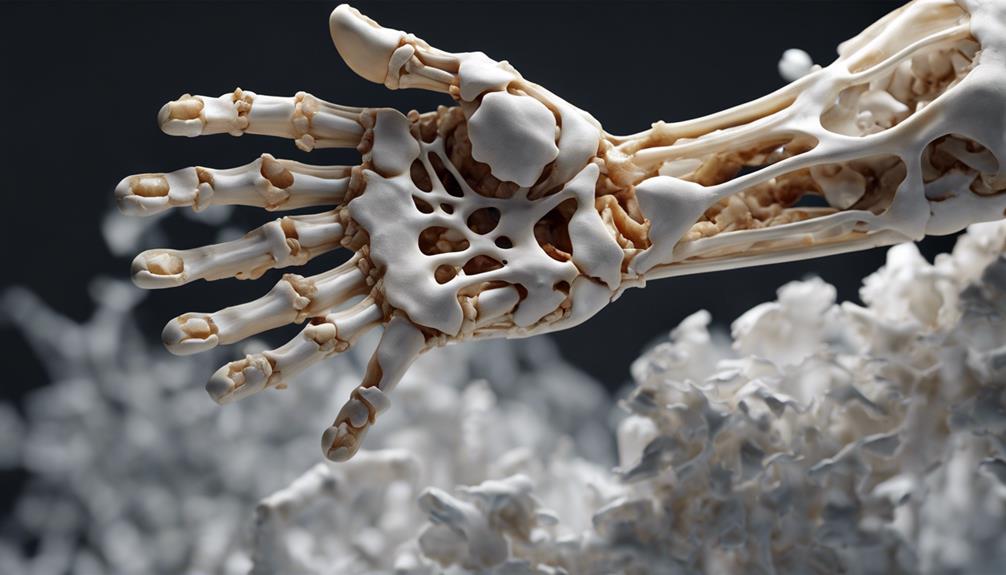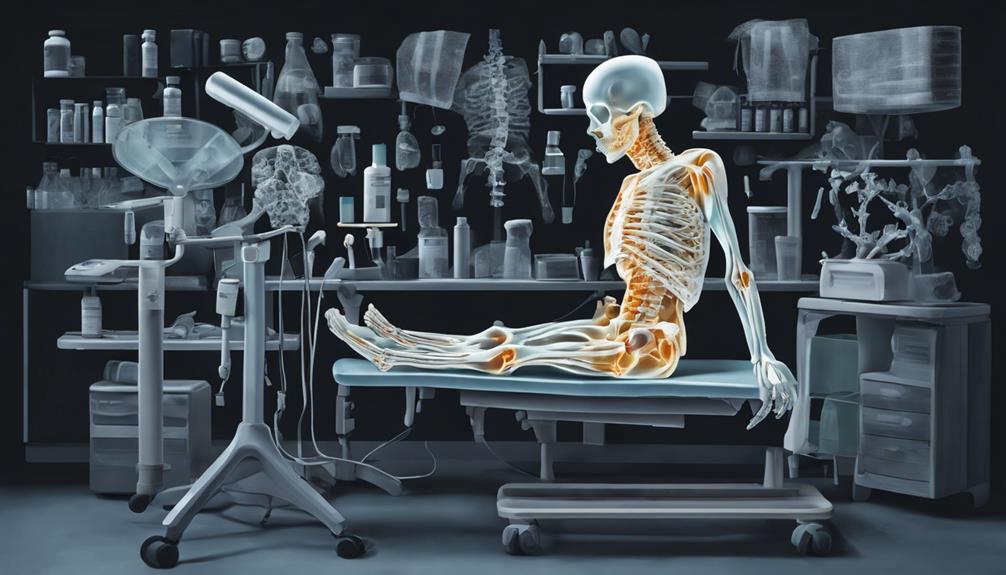You have chosen to look for a local expert in osteoporosis.
Well, let's just say, the search for the right specialist in Houston can feel like finding a needle in a haystack.
But fear not, as we're here to guide you through the maze of choices and help you uncover the best fit for your bone health needs.
Stay tuned to discover some valuable insights that will make your journey towards optimal osteoporosis care a whole lot smoother.
Key Takeaways
- Focus on hormonal management with subdermal contraceptive devices.
- Doctors excel in high-risk obstetrics and minimally invasive gynecological surgery.
- Language barriers are overcome for quality healthcare access.
- Specialized in advanced surgical interventions for osteoporosis challenges.
Top Osteoporosis Doctors in Houston, TX
When seeking top osteoporosis doctors in Houston, TX, our team highly recommends considering the specialized expertise of Dr. George Kuhn, Dr. Rhinehart-Ventura, Dr. Diana Herrera, and Dr. Lalanica Chandrasekera. These doctors, affiliated with Methodist Hospital in Houston, offer exceptional care in the field of osteoporosis.
Dr. George Kuhn, the Chief of Staff 2020 at St Joseph Medical Center, brings a wealth of experience in managing osteoporosis with a focus on Subdermal Contraceptive Devices.
Dr. Rhinehart-Ventura's interests in high-risk obstetrics and minimally invasive gynecological surgery complement her osteoporosis care approach, ensuring comprehensive treatment.
Dr. Diana Herrera's fluency in English and Native Spanish enhances the quality of care she provides at Womens Health Care Associates, making her a standout choice for osteoporosis management.
Dr. Lalanica Chandrasekera, known for her expertise in laparoscopic procedures and robotic systems, has received accolades in obstetrics and gynecology, showcasing her dedication to delivering top-notch osteoporosis care in Houston.
Osteoporosis Specialist Recommendations in Houston

In our search for exceptional osteoporosis specialists in Houston, we recommend considering the expertise of top OB-GYN doctors who offer comprehensive care in women's health.
Dr. George Kuhn stands out for his focus on subdermal contraceptive devices, providing a unique perspective in hormonal management that can be crucial for women with osteoporosis concerns.
Dr. Rhinehart-Ventura, with specialized training from Baylor College of Medicine, excels in high-risk obstetrics and minimally invasive gynecological surgery, offering a holistic approach to women's health care.
Dr. Diana Herrera, fluent in both English and Spanish, delivers expert care at Womens Health Care Associates in Houston, ensuring that language barriers don't hinder quality healthcare access.
Additionally, Dr. Lalanica Chandrasekera's accolades as Chief Resident during her OB-GYN residency highlight her proficiency in laparoscopic procedures and robotic systems, bringing advanced surgical interventions to women facing osteoporosis challenges.
These top OB-GYN specialists in Houston offer a diverse range of expertise in women's health, making them valuable resources for those seeking osteoporosis management with a focus on overall well-being.
Osteoporosis Doctor Search Tips
When looking for an osteoporosis doctor, it's essential to find local specialists covered by your insurance. By verifying insurance coverage, you can ensure financial peace of mind while receiving the necessary care for managing osteoporosis.
Let's guide you through the process of locating an osteoporosis doctor who meets your healthcare needs efficiently.
Find Local Specialists
Navigating the search for an osteoporosis specialist near you can be made smoother by considering key factors like doctor ratings and experience in managing this condition effectively. When seeking local specialists, it's essential to look for board-certified physicians with expertise in treating osteoporosis. Consider facilities like Methodist Sugar Land, Methodist Clear Lake, Methodist West, and Methodist Willowbrook, known for their quality care in osteoporosis management. To assist you further, below is a table highlighting some factors to consider when selecting an osteoporosis doctor:
| Factors to Consider | Description |
|---|---|
| Doctor Ratings | Check online reviews and ratings for insight |
| Experience in Osteoporosis | Look for specialists with a focus in this area |
| Board Certification | Ensure the doctor is certified in osteoporosis |
| Appointment Availability | Find a specialist with convenient availability |
| Insurance Compatibility | Confirm compatibility with your insurance coverage |
Verify Insurance Coverage
Checking your insurance coverage for osteoporosis treatment is a crucial step to ensure affordable and accessible care. Contact your insurance provider to understand the specifics of your coverage, including which in-network doctors specialize in osteoporosis treatment. It's essential to verify that the doctor you select accepts your insurance plan to prevent unexpected out-of-pocket expenses.
Houston Rheumatologists for Osteoporosis Care

In Houston, our team of specialized rheumatologists stands ready to provide exceptional care for individuals dealing with osteoporosis. At Houston Methodist, our doctors who treat Osteoporosis are dedicated to improving bone density and overall bone health through personalized care plans tailored to each patient's needs. Our rheumatologists prioritize comprehensive evaluations to accurately diagnose osteoporosis and then work closely with patients to develop effective treatment strategies. By focusing on individualized care, we ensure that every aspect of the patient's well-being is considered in the management of osteoporosis. With access to expert rheumatologists in Houston, patients can trust that they are in good hands when it comes to their osteoporosis care. Below is a table showcasing some key aspects of our osteoporosis care approach:
| Expert Diagnosis | Tailored Treatment Plans | Patient Well-being |
|---|---|---|
| Comprehensive evaluations to diagnose osteoporosis | Personalized care strategies for each individual | Focus on overall patient health and bone strength |
Finding Female Rheumatologists in Houston

As we continue exploring osteoporosis care options in Houston, discovering female rheumatologists who specialize in diagnosing and treating musculoskeletal conditions is paramount for personalized and empathetic healthcare. Female rheumatologists in Houston are experts in addressing a wide range of issues affecting joints, muscles, and bones, making them invaluable resources for patients dealing with conditions like osteoporosis.
These specialists not only offer tailored care for individuals with autoimmune diseases such as rheumatoid arthritis and lupus but also play a vital role in managing osteoporosis, osteoarthritis, and other musculoskeletal disorders, particularly in women. Seeking out a female rheumatologist in Houston ensures a compassionate approach to healthcare needs, with comprehensive evaluations, individualized treatment plans, and ongoing support for women navigating various rheumatic conditions.
Their expertise and dedication to women's musculoskeletal health make them essential partners in promoting overall well-being and quality of life.
Video Visit Options With Houston Rheumatologists

Houston Rheumatologists offer patients the convenience and accessibility of video visit options for seamless care from the comfort of their homes. These telemedicine appointments with Houston rheumatologists provide a vital avenue for addressing osteoporosis concerns promptly and effectively. By utilizing secure platforms, rheumatologists ensure that each virtual consultation maintains the same level of confidentiality and professionalism as an in-person visit.
Through video visits, patients can connect with Houston rheumatologists without the need to travel, saving time and effort while still receiving expert care. This option not only enhances convenience but also promotes the continuity of care for individuals managing osteoporosis or seeking preventive advice. The safety and efficiency of video visits make them an excellent choice for those with mobility limitations or busy schedules.
Whether discussing treatment plans, medication adjustments, or preventive measures, video visit options with Houston rheumatologists offer a personalized approach to address osteoporosis concerns while prioritizing patient comfort and well-being.
Weekend Appointments With Osteoporosis Specialists

With a focus on accommodating diverse schedules and prioritizing timely care, osteoporosis specialists in Houston extend their availability to include weekend appointments for individuals seeking specialized bone health services. These weekend appointments offer a convenient way for patients to access the expertise of osteoporosis specialists without having to wait for a weekday slot. By providing weekend availability, these specialists ensure that individuals can address their bone health concerns promptly and receive the necessary evaluation and treatment at a time that suits them best.
—
| Benefits of Weekend Appointments with Osteoporosis Specialists |
|---|
| 1. Convenient access to specialized care |
| 2. Timely evaluation and treatment for bone density issues |
| 3. Flexibility for patients with busy weekday schedules |
Frequently Asked Questions
What Is the Best Doctor to See for Osteoporosis?
When looking for the best doctor for osteoporosis, it's crucial to find a board-certified endocrinologist with expertise in managing this condition.
Specialists experienced in diagnosing and treating osteoporosis effectively can provide personalized care tailored to your specific needs.
Consider doctors with a focus on bone health and fracture prevention, affiliated with reputable medical facilities known for excellence in osteoporosis care.
Prioritize comprehensive care and expertise for optimal treatment outcomes.
Do I Need an Endocrinologist for Osteoporosis?
We do need an endocrinologist for osteoporosis!
They specialize in evaluating hormonal imbalances that affect bone density loss. These experts create personalized treatment plans, considering medications and lifestyle changes to address underlying hormonal factors.
Endocrinologists monitor bone density changes over time and adjust strategies accordingly. Consulting an endocrinologist ensures comprehensive care targeting the root causes of bone fragility, ultimately reducing the risk of fractures.
What Is the #1 Treatment for Osteoporosis?
When managing osteoporosis, bisphosphonates like alendronate and risedronate are often the first-line treatment. These medications are effective in slowing bone loss, increasing bone density, and reducing fracture risk.
Additional options may include hormone therapy, denosumab injections, or teriparatide based on individual needs.
It's crucial to consult with a healthcare provider to determine the best treatment plan for your specific condition and medical history.
What Is the Life Expectancy of a Person With Osteoporosis?
We understand your concern about the life expectancy of a person with osteoporosis. Factors like age, health status, and fracture risk influence this. Studies show severe osteoporosis may impact life expectancy.
Early detection, treatment, and lifestyle changes can enhance quality of life and potentially extend it. Regular monitoring, proper medication, and fall prevention strategies are crucial. Seeking medical guidance and adhering to a care plan tailored to individual needs can make a significant difference.
Conclusion
In conclusion, when seeking an osteoporosis doctor near us in Houston, Texas, we're fortunate to have access to top specialists who can provide personalized care for our bone health needs.
By consulting with these experts, we can take proactive steps to improve our overall well-being and manage osteoporosis effectively.
Don't hesitate to reach out to these dedicated professionals for compassionate and specialized care tailored to our individual needs.









